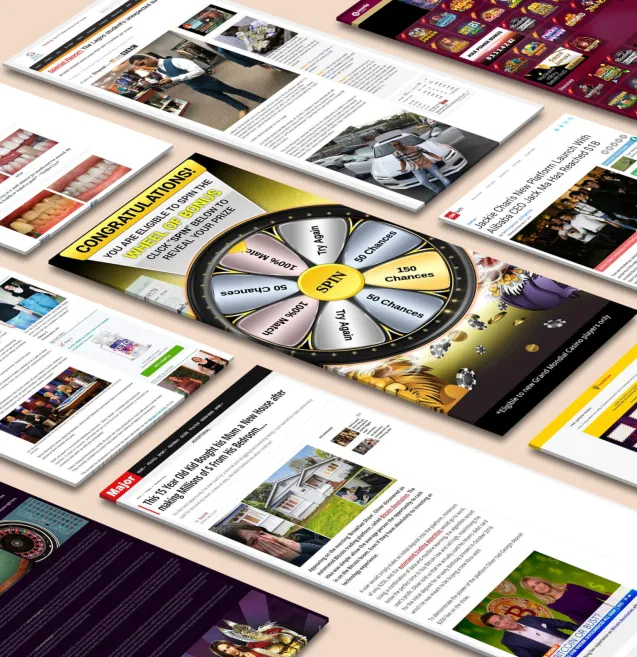
Our spy tools monitor millions of push notification ads from over 90+ countries and thousands of publishers.
Get StartedThe future of content marketing in the AI era is unfolding with unprecedented speed, as artificial intelligence (AI) reshapes how brands engage with their audiences. This transformative period marks an exciting intersection between AI and content marketing, allowing for more efficient, data-driven strategies that cater to personalized customer interactions.
Understanding these advancements is crucial for marketers aiming to stay ahead in the competitive landscape. AI's ability to analyze vast amounts of data and generate insights is revolutionizing traditional content marketing tactics. By leveraging AI technologies, marketers can optimize their strategies, enhance audience targeting, streamline content creation processes, and even dominate push notification advertising by uncovering profitable push ads.
Key Takeaway: Embracing AI technologies can revolutionize content marketing strategies and drive business success. Those who adapt will find themselves better equipped to navigate the complexities of modern marketing, ensuring they remain relevant and impactful in 2024 and beyond. This includes mastering new platforms like TikTok for affiliate marketing, a trend that's becoming increasingly relevant in the digital marketing landscape as highlighted in this comprehensive guide.
Artificial Intelligence (AI) is reshaping the landscape of content marketing by seamlessly integrating into various aspects. From content creation to personalized marketing strategies, AI's role is diverse and continues to grow rapidly.
Tools like Copy.ai and Jasper enable marketers to produce engaging and relevant content quickly. These platforms use advanced natural language processing (NLP) to create high-quality text.
Platforms such as HubSpot and Salesforce use AI to analyze customer data, providing insights that help tailor content strategies effectively.
Tools like MarketMuse and Surfer SEO assist in optimizing content for search engines by analyzing large amounts of data to recommend keywords and structure improvements.
One area where AI integration can significantly enhance results is in native advertising. By utilizing tools such as Anstrex, marketers can spy on profitable native ads, gaining valuable insights that help build winning native advertising campaigns. This not only maximizes the advertising spend but also increases the chances of campaign success.
Similarly, the rise of platforms like TikTok has opened up new opportunities for marketing. With the right strategies in place, these platforms can yield high returns on investment. By employing Anstrex's TikTok ad spying tools, marketers can replicate top converting TikTok ad campaigns, thereby building a profitable business model.
AI's integration into content marketing strategies offers transformative potential but requires careful navigation of its benefits alongside the inherent challenges. Embracing these technologies strategically allows marketers to enhance their campaigns and reach unprecedented levels of engagement.
Machine learning in content creation has emerged as a game-changer for marketers aiming to refine audience engagement and tailor messaging with precision. By leveraging advanced data analysis capabilities, these algorithms can dissect vast amounts of consumer data, uncovering patterns that enable enhanced audience segmentation and targeting.
Machine learning algorithms analyze customer data to identify distinct segments based on behavior, preferences, and interactions. This capability allows marketers to create highly personalized content experiences. For instance:
Moreover, audience expansion strategies can be significantly improved with the application of machine learning techniques, allowing for broader and more effective reach in digital marketing campaigns.
Predictive analytics harness historical data to anticipate customer actions, allowing businesses to optimize content strategies in real-time. This approach involves:
Several leading brands have embraced machine learning techniques with notable success:
Incorporating machine learning into content marketing strategies not only enhances targeting precision but also elevates the overall customer experience. These tools empower brands to deliver messages that resonate deeply with their audiences, setting the stage for more meaningful interactions. Additionally, exploring innovative advertising methods like pop ads, which leverage the power of machine learning for massive scalability, could further enhance marketing efforts.
Generative AI is changing the game for content marketing. It allows businesses to create high-quality, relevant content on a scale never seen before. Unlike traditional AI models that follow set rules, generative AI uses deep learning techniques to understand and create new data patterns. This means it can produce a wide variety of content types, such as articles, social media posts, and video scripts, all tailored to specific audience segments.
The use of generative AI is growing rapidly. In fact, reports show that 66% of organizations are actively looking into how they can use this technology. This growing interest highlights just how important generative AI is for marketers who want to stay competitive in the digital world.
By incorporating these advanced tools into their strategies, brands can:
However, it's not all smooth sailing. There are also challenges that come with adopting generative AI:
Despite these challenges, generative AI represents a significant shift towards more flexible and responsive content marketing strategies. As organizations continue to explore these technologies, the potential for creating meaningful customer experiences increases dramatically.
The rapid advancement of AI has spurred an ongoing debate: should content marketing prioritize efficiency or maintain quality? Generative models offer unparalleled speed in producing content, yet this efficiency often comes with authenticity concerns. The challenge lies in achieving a balance where AI-generated content not only meets high-quality standards but also resonates with audiences.
Quality assurance in AI-generated content is crucial as businesses strive to uphold the principles of expertise, authority, and trustworthiness (E-E-A-T). These factors significantly influence search engine rankings and consumer perception:
AI's role in content marketing necessitates a strategic approach where technology complements human creativity rather than replaces it. Effective use of generative models involves meticulous editing and refinement processes to ensure content aligns with brand values and audience expectations.
Brands must navigate these challenges by integrating robust quality control measures and leveraging E-E-A-T principles to enhance both automated and manually curated content. As AI continues to evolve, the interplay between maintaining efficiency and ensuring quality will define the future landscape of content marketing strategies.
Personalized marketing strategies powered by AI have transformed the way businesses engage with their audiences. By leveraging advanced data analytics, companies can decode vast amounts of customer data to craft highly targeted messages that resonate personally with each individual.
Understanding the nuances of customer preferences and behaviors enables marketers to create content that speaks directly to the needs and desires of their audience. This level of personalization is achieved through data-driven insights, which involve:
A practical example involves e-commerce platforms using AI to recommend products based on browsing history and previous purchases. This personalized approach not only enhances customer satisfaction but also drives conversion rates and fosters brand loyalty.
Through these strategies, businesses can move beyond generic messaging to offer experiences that feel uniquely crafted for each customer. The result is a deeper connection between the brand and its audience, laying the groundwork for sustained engagement and increased sales.
In the age of AI, content marketing is evolving towards an experience-driven business model powered by AI solutions. This new approach aims to bring together different digital channels to create seamless and tailored experiences for audiences.
The integration of these technologies marks a shift towards more flexible and adaptive content marketing operations. As brands continue to explore these opportunities, they will be better equipped to meet the expectations of their target audience in an increasingly interconnected world.
In the ever-changing world of content marketing, thought leadership through storytelling is still a crucial element that AI hasn't quite figured out yet. While AI is great at handling data and creating content quickly, it often misses the subtle understanding needed to tell stories that truly connect with people. Creating powerful stories that inspire trust, empathy, and action is something only humans can do.
Machines have their limitations when it comes to expressing human emotions or dealing with different cultural backgrounds. For example, an article written by AI might be perfectly optimized for search engines but fail to establish an emotional connection with its readers. This is where human creativity comes into play, adding depth and relatability to the content.
Here are some key areas where human creativity excels over AI:
Finding a balance between automation and intuition is crucial for effective messaging strategies. Brands can benefit from using AI's efficiency while also incorporating the human touch that makes communication impactful.
This combination of technology and creativity becomes increasingly important as businesses strive to connect with their audiences in meaningful ways.
As the influence of AI in content marketing grows, ethical considerations around using generative models responsibly become increasingly crucial. Text generation technologies like GPT-3.5 Turbo offer remarkable capabilities but also present significant risks that businesses must address.
Exploring these strategies allows organizations to harness the power of generative models while maintaining ethical integrity, paving the way for responsible innovation in content marketing.
The future of content marketing in the AI era is set against a backdrop of rapid technological evolution, prompting brands to rethink their strategies. As artificial intelligence continues to weave itself into the fabric of digital marketing, businesses are exploring synergies between human expertise and machine intelligence. This partnership aims to harness the strengths of both entities to craft strategies that are not only efficient but also deeply resonant with human audiences.
Possible Scenarios:
The integration of human-centric approaches with intelligent systems represents a forward-thinking paradigm in digital marketing. By strategically balancing automation with human intuition, brands can navigate an uncertain future while ensuring their content remains relevant, engaging, and impactful.
In this evolving landscape, dropshipping could emerge as a significant opportunity. By leveraging AI to identify hottest selling dropship products, businesses can streamline their operations and focus on creating meaningful content that resonates with their audience.
As the world of content marketing continues to change, it's important for marketers to stay up-to-date with the latest technological advancements if they want to make the most of AI. New technologies like machine learning and natural language processing can greatly improve content marketing by making processes more efficient and enabling personalized and engaging content delivery.
But technology alone isn't enough to build strong relationships with consumers. Creativity and empathy are still crucial in connecting with audiences on a deeper level. By combining human intuition with intelligent systems, marketers can create powerful stories that promote understanding and respect.
In the age of AI, the future of content marketing will involve a combination of automation and human creativity. This partnership will lead brands to develop better messaging strategies, helping them stay competitive in a constantly evolving digital landscape. To succeed in this exciting new era, it's essential to prioritize both technological innovation and the enduring qualities of empathy and creativity.
Receive top converting landing pages in your inbox every week from us.
Tips & Tricks
Push notifications can be a powerful tool for driving engagement and conversions during the festive season. Discover practical tips for crafting timely, personalized, and irresistible messages that capture attention instantly. Learn how to balance frequency, tone, and timing to maximize results without overwhelming users. Perfect for marketers ready to make their holiday push campaigns truly impactful.
Liam O’Connor
7 minDec 2, 2025
Must Read
Successful holiday marketing goes beyond a single channel—it’s about creating harmony between Native, Push, and Pop ads. Learn how to integrate these three formats to reach audiences at every stage of the buying journey. Discover strategies for maximizing visibility, engagement, and conversions during the busiest shopping season. A must-read for advertisers aiming to deliver cohesive, high-impact holiday campaigns.
Priya Kapoor
7 minNov 30, 2025
Must Read
This blog uncovers how AI can transform holiday marketing campaigns into high-performing, data-driven successes. It explains how AI tools help optimize targeting, personalize messaging, and predict consumer behavior for better engagement. Readers will learn practical ways to fine-tune their campaigns and boost conversions during the busy holiday season. Ideal for marketers looking to maximize results and efficiency with AI-powered strategies.
Marcus Chen
7 minNov 21, 2025




